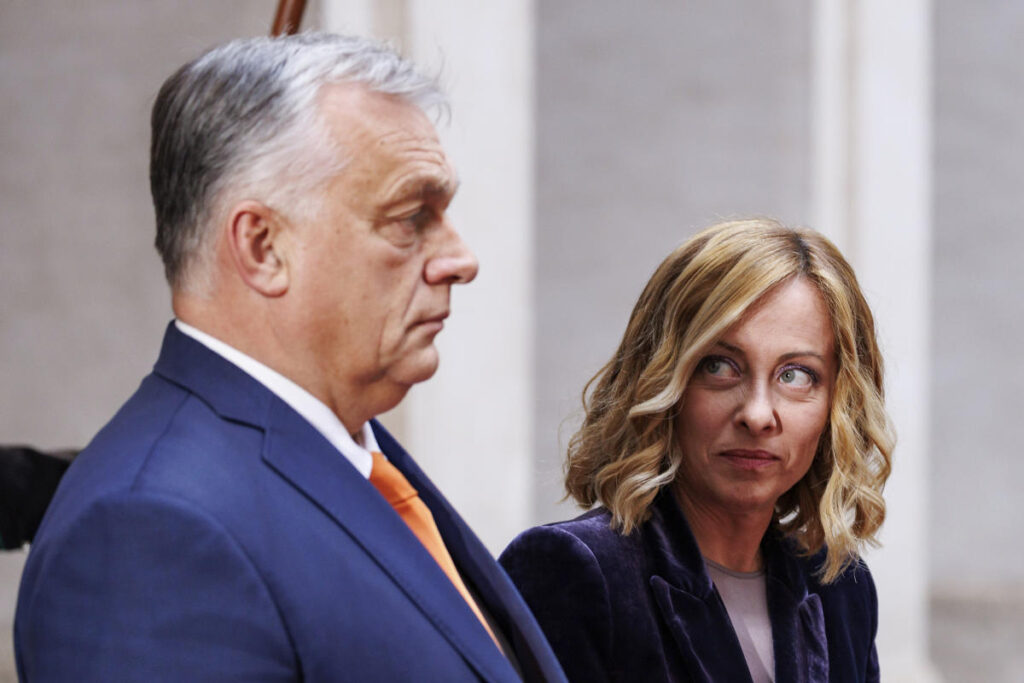Italian Premier Giorgia Meloni hosted a meeting with Hungarian Prime Minister Viktor Orbán in Rome, where the two leaders engaged in discussions on several pressing international issues. Central to their conversations was the ongoing conflict in the Middle East as well as the war in Ukraine. Both Meloni and Orbán expressed their desire for a peaceful resolution to these conflicts, reaffirming their commitment to supporting Ukraine’s reconstruction. This dialogue takes place against a backdrop of increasing geopolitical tensions and represents a collaboration between two of Europe’s far-right leaders, emphasizing their shared perspectives on pressing regional matters.
During their 90-minute meeting at the Italian government’s headquarters, Meloni congratulated Orbán on Hungary’s recent assumption of the six-month rotating presidency of the EU Council. She also acknowledged significant milestones in European integration, particularly regarding the first chapter of accession talks with Albania, and progress made alongside Bulgaria and Romania in the expansion of the Schengen area. These discussions highlight a commitment to European unity and cooperation, illustrating how Meloni and Orbán view their roles as pivotal within the broader context of EU governance and Eastern European progress.
Another prominent theme of their meeting was the ongoing crisis surrounding irregular migration across Europe. Both leaders underscored the importance of addressing the root causes of migration, advocating for increased cooperation with countries of origin and transit to tackle issues tied to human trafficking and smuggling. They emphasized the need for a comprehensive approach that blends humanitarian concerns with strict immigration policies, reflecting a common narrative among right-wing leaders in Europe about the importance of border control and national sovereignty.
Particularly pressing was their agreement on the need to create a more efficient legal framework that would streamline the process of returning migrants from the EU. They specifically called for initiatives that would enhance the concept of “safe countries of origin,” making it easier to facilitate returns. Meloni and Orbán proposed that exploring new ways to counter irregular migration aligns with both EU and international law, indicating an openness to innovative strategies that could reshape current migration approaches while maintaining a commitment to legality and security.
One area highlighted in their discussion was the Italy-Albania agreement aimed at expediting the processing of migrants’ asylum requests, suggesting a willingness to collaborate on regional solutions. Under this agreement, newly opened reception centers in Albania are intended to manage asylum seekers more effectively, with the processing falling under the jurisdiction of Rome. However, Meloni faces challenges in implementing this deal, as Italian magistrates have blocked the transfer of migrants rescued at sea to these facilities in Albania, citing concerns regarding the safety of the migrants’ countries of origin for repatriation.
In summary, the meeting between Meloni and Orbán illustrates a shared commitment to addressing key issues of migration, security, and regional cooperation within the framework of the EU. Their discussions reflect a mutual alignment on several contentious matters, especially the prioritization of national interests and the management of migration flows, all while navigating the complex landscape of international law and humanitarian concerns. As both leaders maneuver through these challenges, their partnership signifies a growing trend of right-wing populism in European politics, impacting future EU policies and the continent’s approach to global crises.

